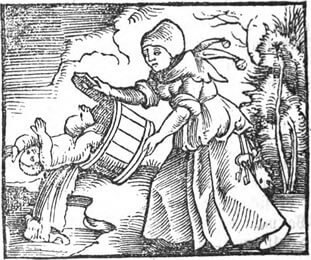Prisoners were taken to the gallows (after a fair trial of course!) to be hanged.
The horse-drawn dray, carting the prisoner, was accompanied by an armed guard, who would stop the dray outside the pub and ask the prisoner if he would like ''ONE LAST DRINK''.
If he said YES, it was referred to as ONE FOR THE ROAD.
If he declined, that Prisoner was ON THE WAGON.
So there you go ...
More history....................
They used to use urine to tan animal skins, so families used to all pee in a pot and t hen once a day it was taken and sold to the tannery.
If you had to do this to survive you were "piss poor".
But worse than that were the really poor folk, who couldn't even afford to buy a pot, they "Didn't have a pot to piss in" and were the lowest of the low..
==
The next time you are washing your hands and complain because the water temperature isn't just how you like it, think about how things used to be.............
Here are some facts about England in the 1500s:
Most people got married in June,because they took their yearly bath in May and they still smelled pretty good by June.!!
==
However, since they were starting to smell, brides carried a bouquet of flowers to hide the body odour.
Hence the custom today of carrying a bouquet when getting married.
==

Baths consisted of a big tub filled with hot water.
The man of the house had the privilege of the nice clean water,
then all the other sons and men, then the women and finally the children.
Last of all the babies.
By then the water was so dirty you could actually lose someone in it.!
Hence the saying,
"Don't throw the baby out with the bath water!"
==
Houses had thatched roofs, thick straw piled high, with no wood underneath.
It was the only place for animals to get warm, so all the cats and other small animals (mice, bugs) lived in the roof.
When it rained it became slippery and sometimes the animals would slip and fall off the roof. Hence the saying "It's raining cats and dogs."
==
There was nothing to stop things from falling into the house.
This posed a real problem in the bedroom,
where bugs and other droppings could mess up your nice clean bed.
Hence, a bed with big posts and a sheet hung over the top afforded some protection.
That's how canopy beds came into existence.
==
The floor was dirt Only the wealthy had something other than dirt.
Hence the saying, "dirt poor."
The wealthy had slate floors that would get slippery in the winter when wet, so they spread thresh (straw) on the floor to help keep their footing.
As the winter wore on they added more thresh until, when you opened the door,it would all start slipping outside.
A piece of wood was placed at the entrance.
Hence: a thresh hold. (Getting quite an education, aren't you?)
==
Sometimes they could obtain pork, which made them feel quite special.
When visitors came over they would hang up their bacon, to show off.
It was a sign of wealth that a man could, "Bring home the bacon."
They would cut off a little to share with guests and would all sit around talking and ''chew the fat''.
==
Those with money had plates made of pewter.
Food with high acid content caused some of the lead to leach onto the food, causing lead poisoning and death.
This happened most often with tomatoes.
So for the next 400 years or so, tomatoes were considered poisonous.
==
Bread was divided according to status.
Workers got the burnt bottom of the loaf,
The family got the middle, and guests got the top, or ''The Upper Crust''.
==
Lead cups were used to drink ale or whisky.
The combination would sometimes knock the imbibers out for a couple of days. Someone walking along the road would take them for dead and prepare them for burial. They were laid out on the kitchen table for a couple of days and the family would gather around and eat and drink and wait and see if they would wake up.
Hence the custom of ''Holding a Wake''.
==
England is old and small and the local folks started running out of places to bury people, so they would dig up coffins and would take the bones to a bone-house and reuse the grave.!
When reopening these coffins, 1 out of 25 coffins was found to have scratch marks on the inside and they realised they had been burying people alive. So they would tie a string on the wrist of the corpse, thread it through the coffin and up through the ground and tie it to a bell.Someone would have to sit out in the graveyard all night (the graveyard shift) to listen for the bell; thus someone could be, ''Saved by the Bell ''or was considered a ''Dead Ringer'' And that's the truth.!!
==






















